Dropshipping Product Sourcing: How To Source Products for Your Store
Not sure how to pick the best dropshipping product sourcing method or what dropshipping product supplier to use? I can help you make the right decision!
Want to become a successful online seller? Then, you have to keep a steady supply of great products that will delight your buyers and solve their problems.
Knowing where to look for products is a deciding factor in whether they will be met with a warm reception.
But knowing how to do it is much better. So, in this guide I will show you the best tips, tricks and strategies to source products for dropshipping. So, let’s start!


Table of Contents
- Key Takeaways
- What Is Product Sourcing For Dropshipping?
- 4 Ways To Source Products For Your E-Commerce Store
- The No. 1 Tool for all dropshippers – now with AI
- Dropshipping Product Sourcing: How To Source Products For Your Dropshipping Business?
- Step By Step Guide To Dropshipping Product Sourcing (My Approach)
- Best Companies For Dropshipping Product Sourcing
- Succesful Life Stories For Effective Dropshipping Product Sourcing
- Dropshipping Product Sourcing FAQs
- 1. How do you handle customer returns or exchanges when working with dropshipping suppliers?
- 2. What specific criteria should be used when evaluating the reliability and quality of potential dropshipping suppliers?
- 3. What are the legal considerations and agreements needed when setting up partnerships with dropshipping suppliers?
- Final Thoughts
Key Takeaways
- Understanding product sourcing is crucial for dropshipping, akin to finding the perfect ingredients for your secret recipe.
- Selecting the right suppliers is key for maintaining product quality, ensuring timely deliveries, and keeping up with demand.
- Making your own products offers satisfaction from selling unique creations but requires significant time and effort.
- Effective strategies for finding reliable dropshipping suppliers include using search engines, online directories, online marketplaces, and leveraging product research tools.
- Negotiating contract terms with suppliers is crucial for favorable conditions, including payment terms, shipping costs, and handling of returns or defective products.
- Real-life success stories, like Irwin Dominguez and Alex Philip, provide inspiration and show the potential for rapid growth and success in dropshipping.
- Having products manufactured provides control over production and branding but comes with high costs and time investment.
- Buying from wholesalers allows for discounted pricing and higher margins but requires bulk purchasing and storage.
- Sourcing from dropshipping suppliers is the simplest method, with no need for inventory but requires careful selection of suppliers for integration with e-commerce platforms.
What Is Product Sourcing For Dropshipping?
Before focusing on the ways to source products for your e-commerce store, including the dropshipping product sourcing method, let’s define the term product sourcing.
If you’re diving into the world of dropshipping, understanding product sourcing is like finding the perfect ingredients for your secret recipe.
Imagine you’re the chef in your own restaurant, but instead of food, you’re serving up awesome products to your customers.
Product sourcing is all about finding those amazing items that your customers will love, from reliable suppliers who can deliver quality and keep up with demand.
Here’s the deal: when you run a dropshipping business, you don’t keep the products in stock. Instead, when a customer orders something from your online store, you pass the order to your supplier.
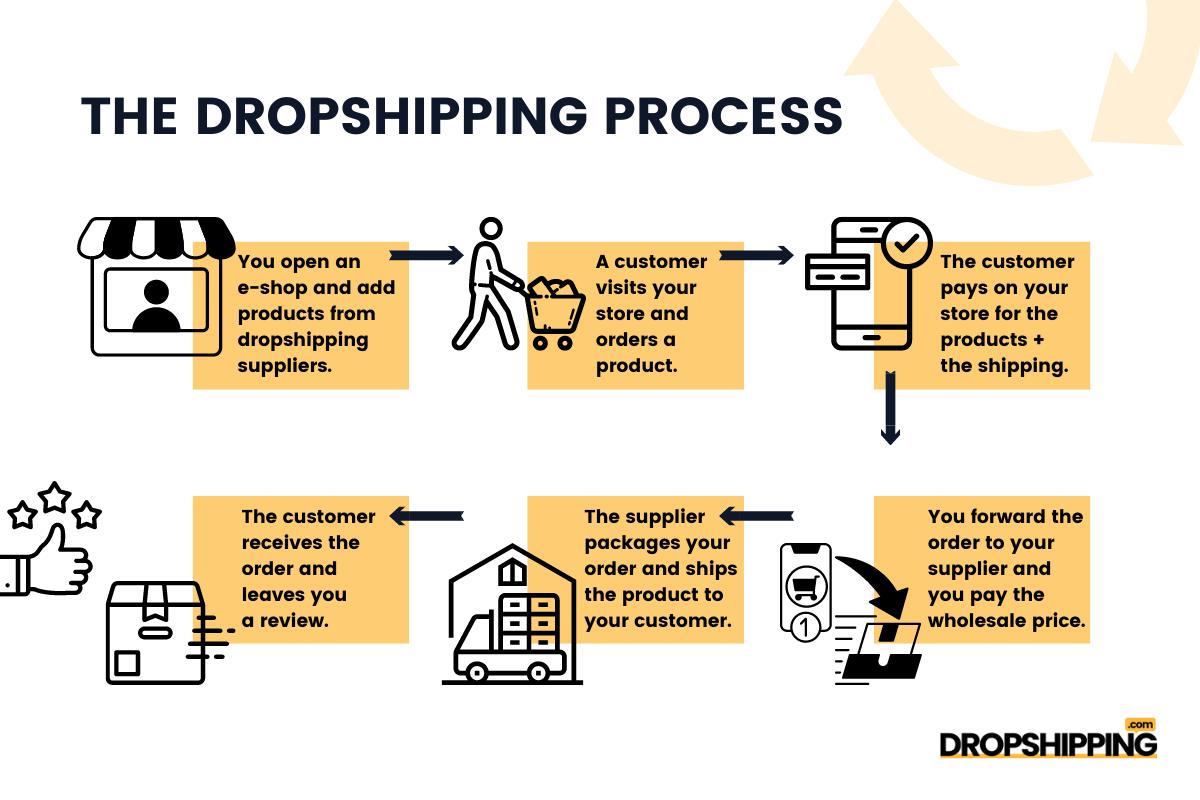
Then, your supplier ships the product directly to your customer. It’s like being a matchmaker between your customers and the products they’re searching for, without ever having to stockpile or manage inventory yourself.
So, finding the right suppliers is key. You want partners who not only have the cool products your customers are looking for but also understand the dropshipping game.
They need to be reliable in shipping products on time, maintaining quality, and keeping you in the loop about inventory levels.
In a nutshell, product sourcing for dropshipping is about building relationships with suppliers who can help you delight your customers. It’s about scouting for products that stand out and negotiating with suppliers to ensure quality and profitability.
Ultimately, make sure your customers receive what they ordered, love what they get, and keep coming back for more.
4 Ways To Source Products For Your E-Commerce Store

Below, I will outline the different product sourcing methods to help you find the right one for your business. Let’s get started!
Make your own products
The idea of making a living by making things from scratch and selling or trading them for something else is as old as the hills. In today’s digital age, you have a much wider reach for selling your own products.
Undoubtedly, creating and selling your own products online is both exciting and challenging. Though coming up with your product idea is the first step in starting your online business, there is actually far more to the process.
👉 Read about Digital Dropshipping: How To Start Dropshipping Digital Products.
You need to spend a lot of time planning, designing, creating, and marketing your products. Also, you need to think ahead about how you will scale and grow your online business.
The road to selling your own products online is difficult. That said, the deep pleasure and satisfaction you feel when customers like and buy your unique creations may make all the hard work worthwhile.
For example, if you want to create your own dropshipping products, you can try only print on demand services.
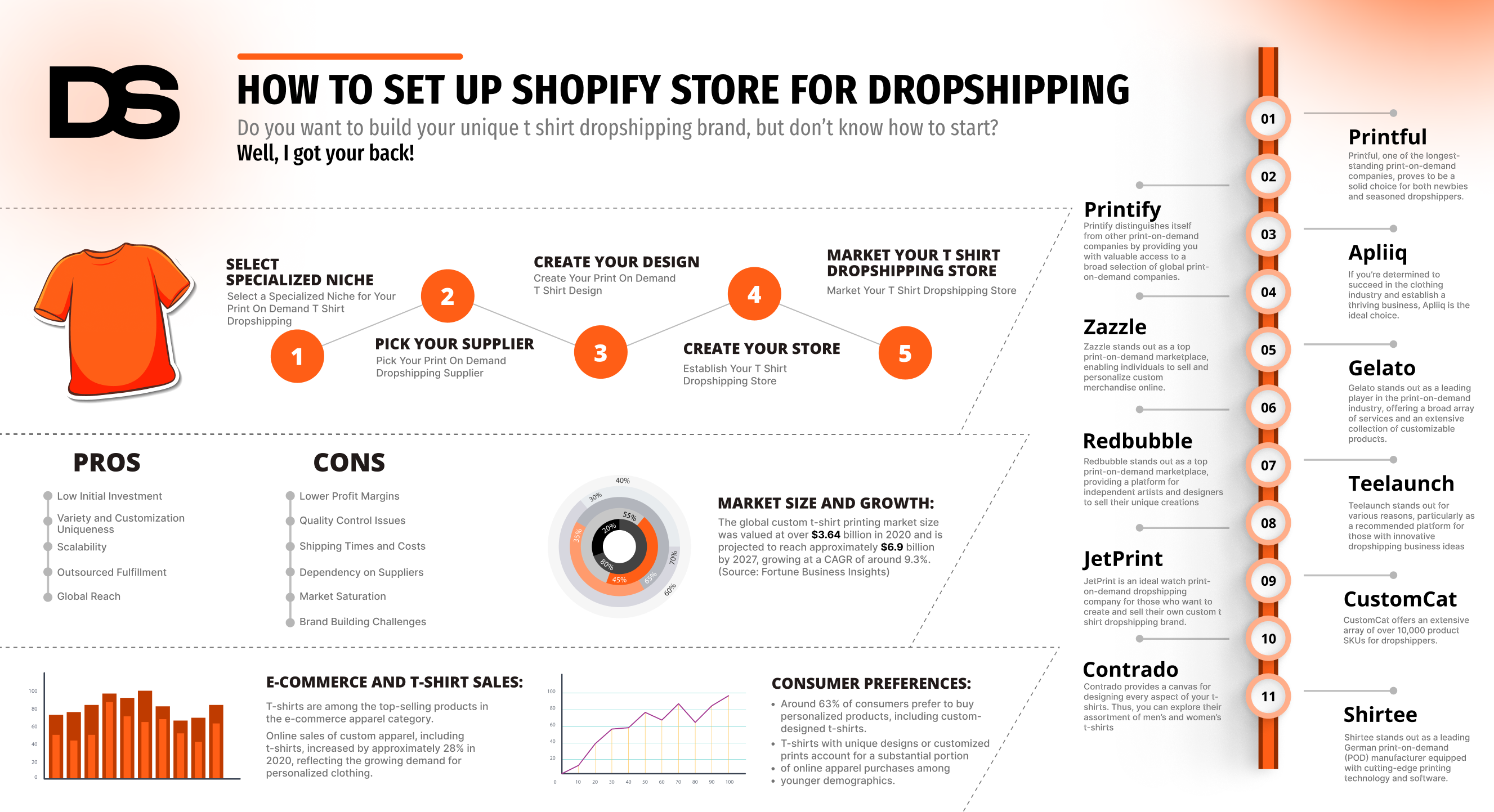
Thus, in my case, I looked at the Apliiq t-shirt options. Once you decide on a t-shirt or anything else from their collection, it takes you to a page where you can play with the design.

Using the Apliiq Design Tool is super easy. You handle it all through the Apliiq site.
This is when you get to make the t-shirt your own. You can add your own designs, words, pictures, sayings, colors, and more to make the t-shirt fit what you like.

Even better, the design tool lets you see your design on the t-shirt before it gets printed. You get to check how it looks and where your logo or brand name goes.
This means you can make sure your design looks just right on the t-shirt before it gets made.
Have your products manufactured for you
If creating your own products is too much of a hassle, you can engage a manufacturer to do so on your behalf.
Still, having your products manufactured for you is not the easiest way to source products for your online store. But why is it so?
First, you need to start with product designs and prototyping. Second, you need to find a manufacturer that can turn your own product idea into reality.
As you can assume, this type of dropshipping product sourcing is the priciest and the most time-consuming approach.
Manufacturers usually have high minimum order quantity requirements to start production, not to mention the lead times.
Sure, this product sourcing method gives you greater control over production, adaptability, branding, and profitability.
Some manufacturers allow you to select a generic product they already manufacture. Then, they can improve or alter it according to your preferences.
But this means you will have to deal with a lot of competition because the manufacturer will probably sell the same product to many other online stores.
Here’s an example.
For example, private label dropshipping is perfect in a situation like this. In my opinion, Rocktomic is a game-changer if you’re looking to make money with private label dropshipping easily and effectively.
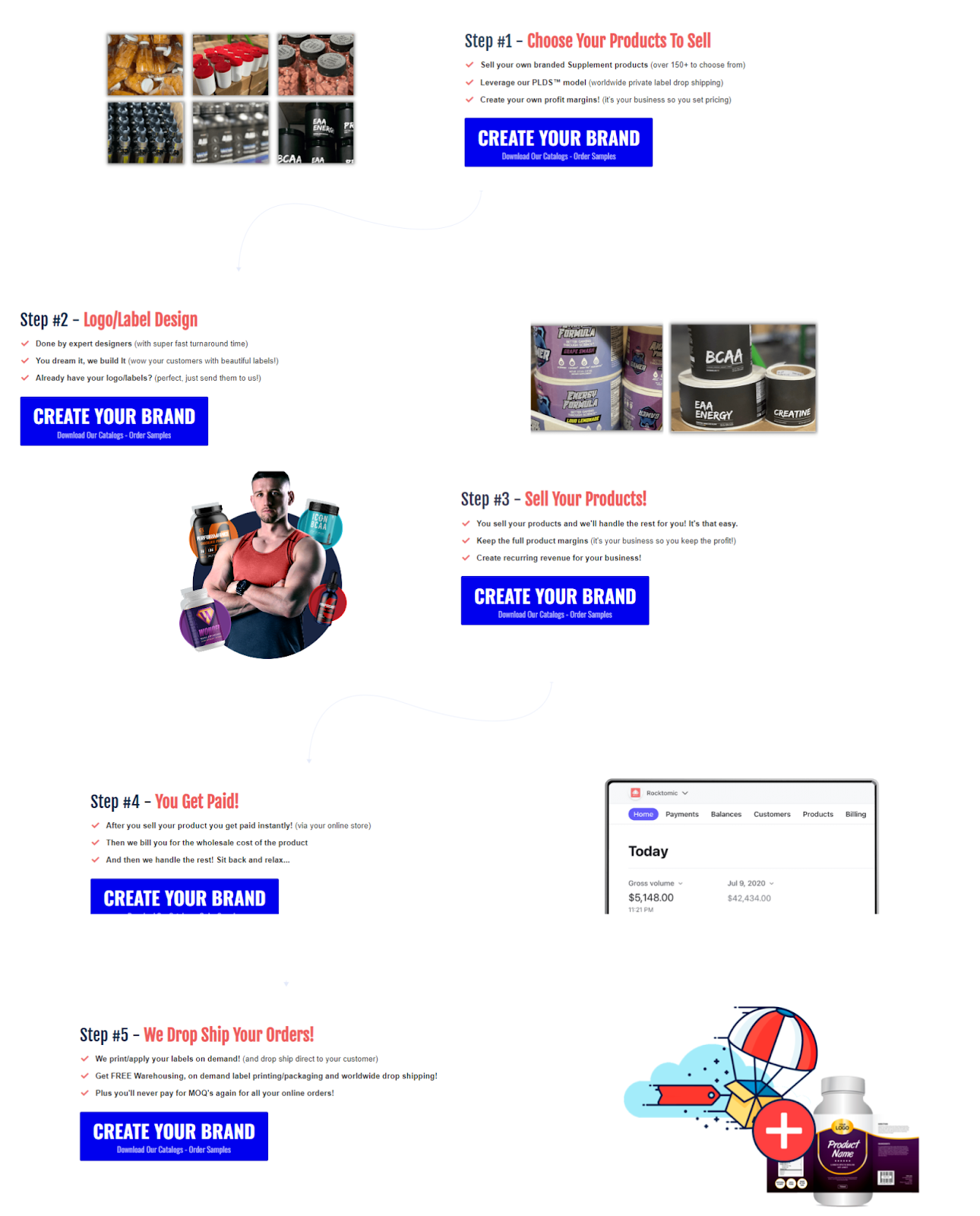
By choosing Rocktomic, you’re stepping into the world of selling products under your own brand, without the headache of keeping stock or managing deliveries.
Rocktomic takes care of all that for you.
The best part? They not only find and make the products for you but also slap your logo on them and handle all the shipping details.
This frees you up to concentrate on what matters most – marketing and selling your products. You’re not tied down by the hassle of logistics and inventory.
And the cherry on top? You buy these products at wholesale prices, sell them at retail prices, and keep the profit. Pretty sweet deal, if you ask me.
Buy your products from a wholesaler
Buying your products from a wholesaler is definitely a much easier way to get inventory for your e-commerce business. In essence, wholesalers are middlemen between manufacturers and online sellers like you.
Moreover, they obtain large quantities of goods at lower prices and sell them to retailers and online businesses.
Retailers and online businesses usually sell these products from their e-commerce stores to end consumers.
If you choose to source your products from wholesalers, you will enjoy discounted pricing and higher profit margins. But you will have to buy in bulk and make sure you have enough space for all your stuff.
Also, it is worth mentioning that many wholesalers offer dropshipping services. This means that you can source products for your dropshipping business by working with a wholesaler.
For example, BigBuy operates as a wholesaler that offers dropshipping services.

It allows you to access the entire range of BigBuy’s inventory without the need for personal storage space or maintaining your own stock.
Wholesale vs Dropshipping Product Sourcing – What’s the difference?
Inventory Source Review – Is this the best Dropshipping Automation Software?
Buy your products from a dropshipping supplier
Compared to the previous product sourcing methods, working with a dropshipping supplier is the easiest way to source your products.
Let me explain what I mean. Namely, by using the dropshipping product sourcing method, you can list products from a dropshipping supplier on your online store without physically holding them.
When someone orders a product from your dropshipping store, you place the order with the supplier. Then, the supplier ships the item directly to your customer. It is that simple.
That’s why the dropshipping product sourcing method is quite popular nowadays.
However, I highly recommend you choose dropshipping suppliers that can connect with your ecommerce platform with ease.
Thus, you probably want to automate the whole process of product import, inventory management, order fulfillment, etc. Therefore, this is crucial.
For example, I am personally working with AutoDS as my dropshipping supplier since it integrates with Shopify (the ecommerce platform I use).
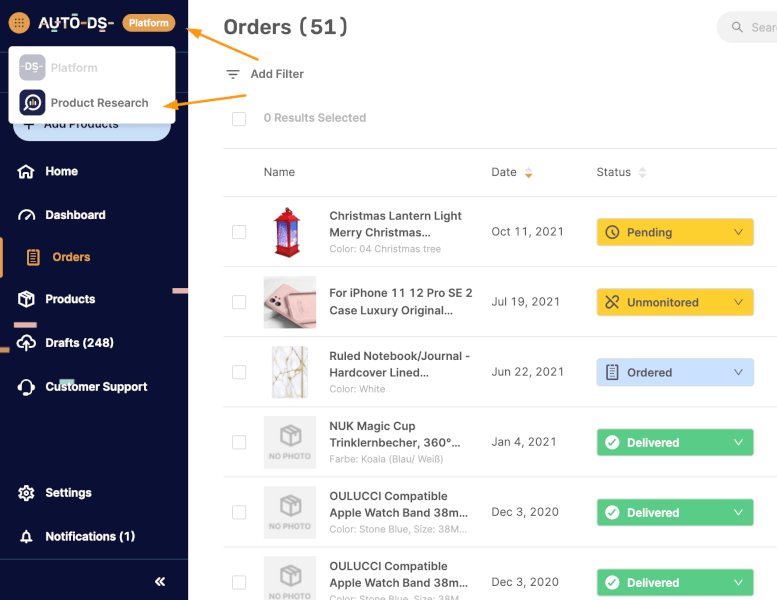
So, everything from product sourcing to fulfilling and tracking orders is automated.
Dropshipping Product Sourcing: How To Source Products For Your Dropshipping Business?
Here are the practical tips on how to source products for your dropshipping store the right way:
Do Your Own Research
Doing research before diving into the dropshipping business is crucial. In fact, I must say that finding a reliable dropshipping supplier is actually the main topic.
So, I can share with you several tactics to find dropshipping suppliers for dropshipping product sourcing.
➡ Use Search Engines
The first step in finding dropshipping suppliers is to do it yourself. Just open a search engine like Google and search with keywords related to dropshipping suppliers.
For instance, if you’re looking for suppliers in the USA, you could search for “best dropshipping manufacturers USA” and see what comes up.

But, it might be tough to tell if they’re legitimate or not. Even genuine dropshipping suppliers might not have the slickest websites or the best-looking product catalogs, so looks can be deceiving.
Choosing to search on your own is free, but be careful! It could end up costing you more in the long run in terms of both money and time wasted.
➡ Online Directories
There are numerous online directories like Dropshipping.com or AutoDS, where you can search for reputable suppliers. For instance, Dropshipping.com lists a ton of verified suppliers.
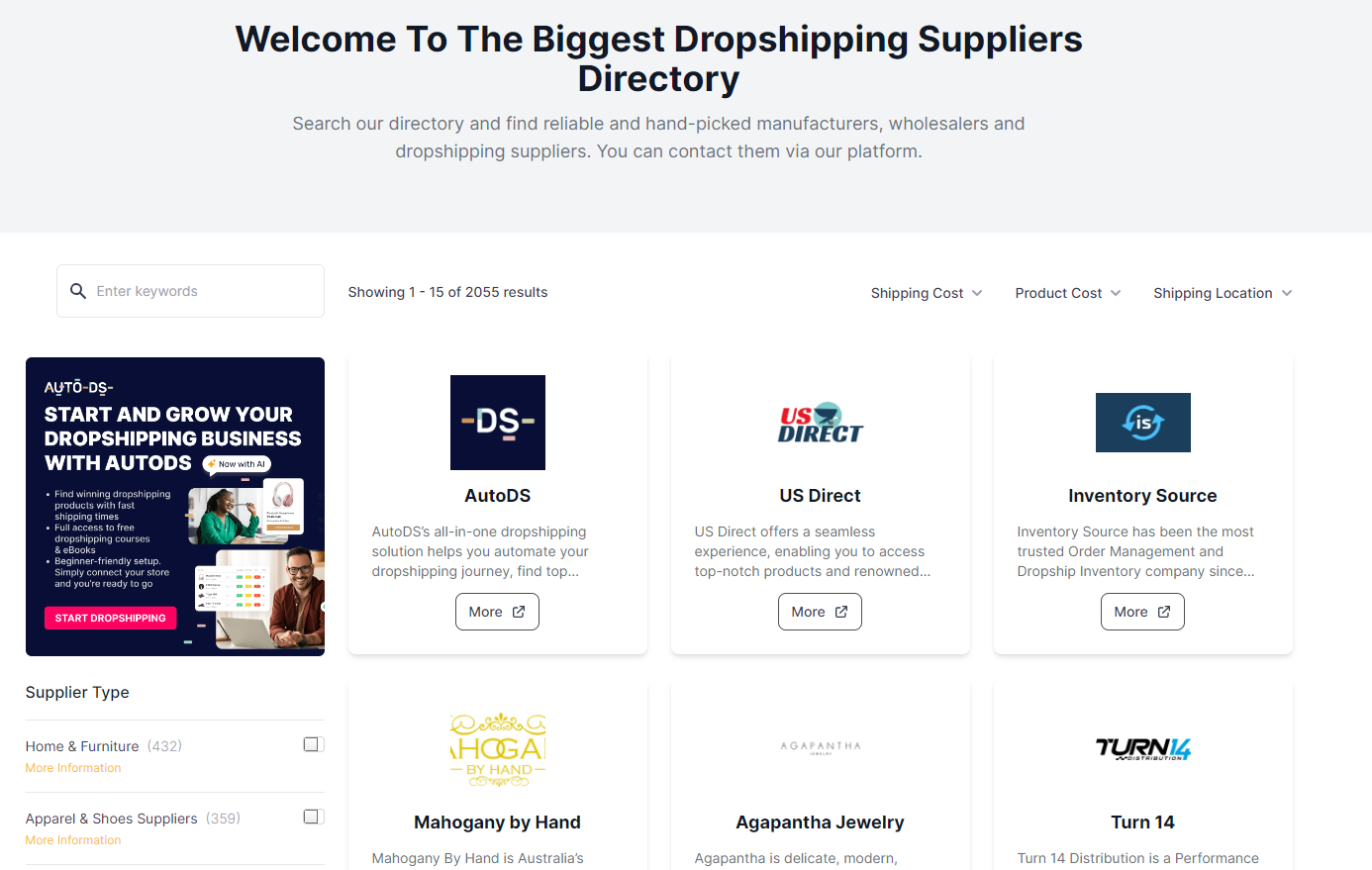
You can search through them based on product types, shipping and product costs, and where they’re located, among other things.
You’ll also find important details about each supplier, like minimum order quantities, product costs, how long they take to process orders, and how to contact them. 👇
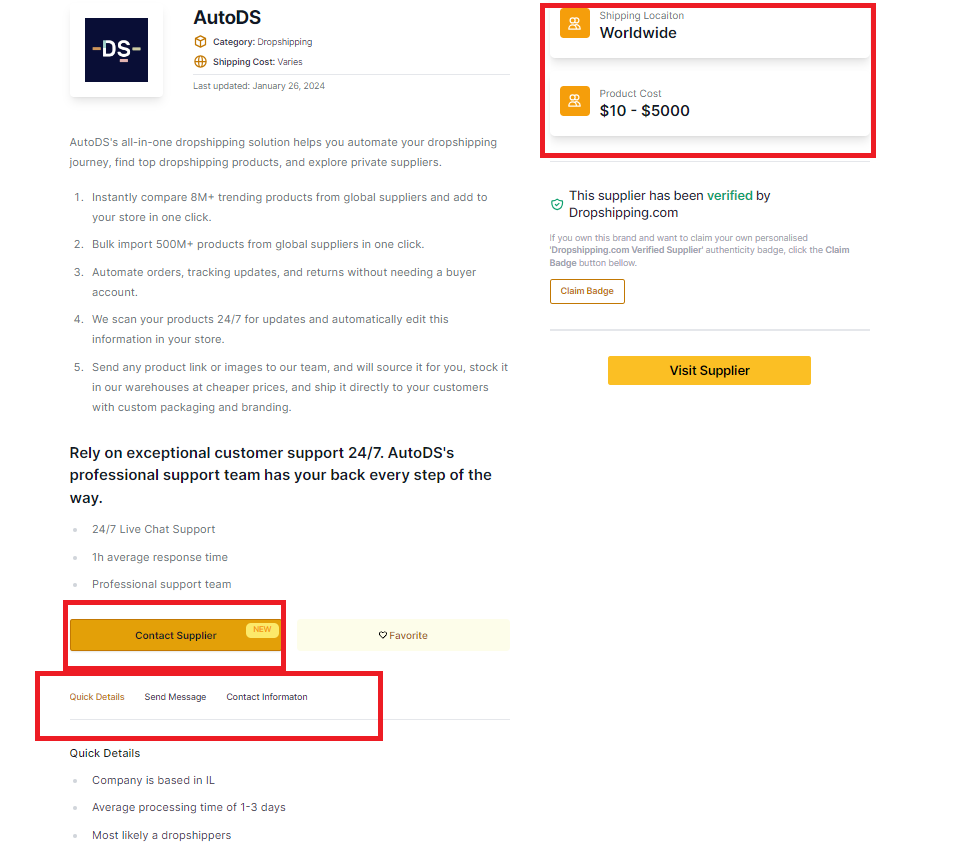
And if you’re stuck, Dropshipping.com’s team can help you find or reach out to specific suppliers.
➡ Online Marketplaces
Platforms like Alibaba, AliExpress, and eBay let you search for and communicate with suppliers. But remember to check their ratings and reviews before partnering with them.
For example, tools like the Up Assistant for AliExpress help you evaluate sellers more thoroughly, considering their history and how well they communicate, giving you a fuller picture before you decide to buy.
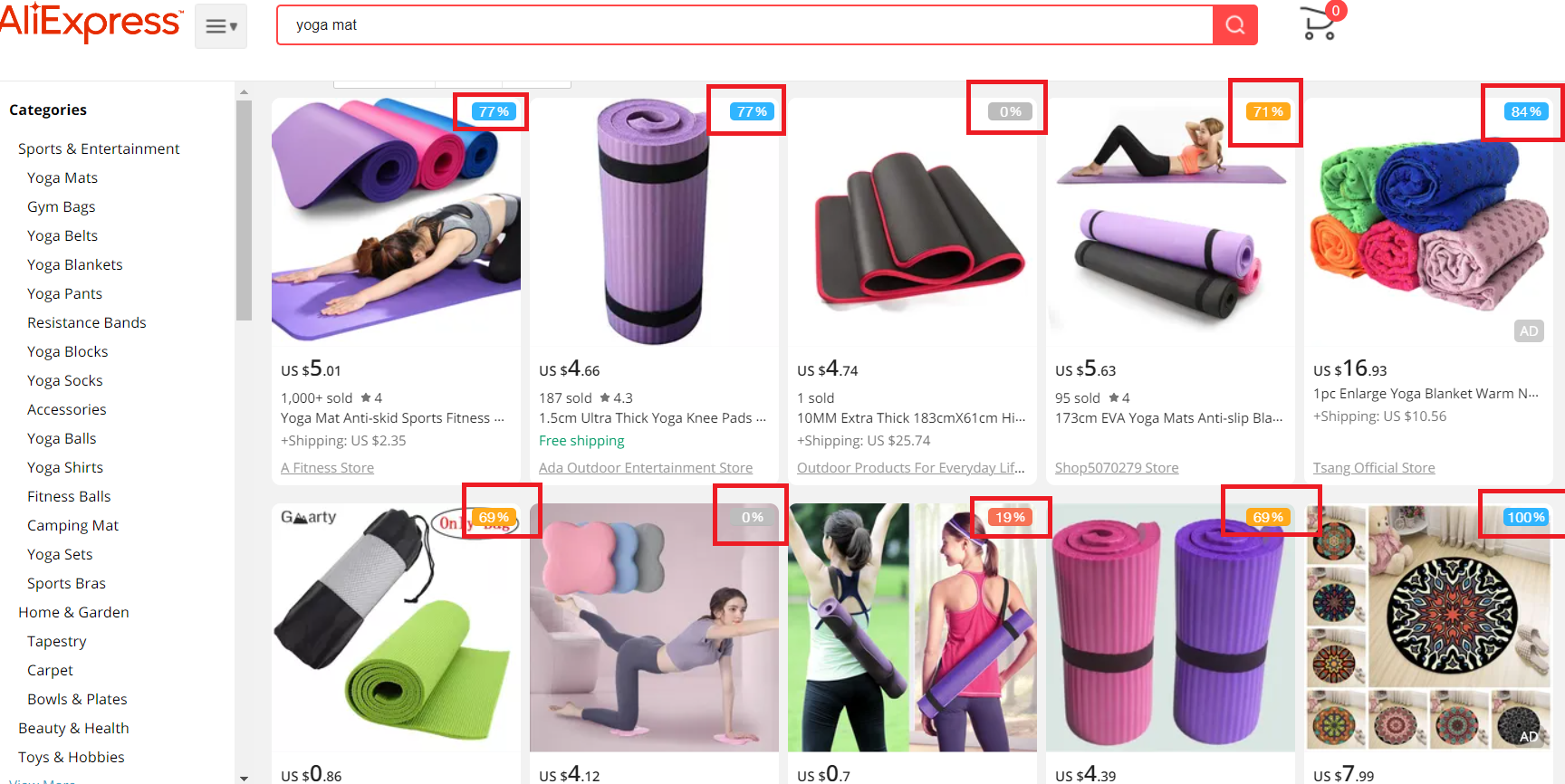
➡ Product Research Tools
These tools are not definitely just for product research. Hence, product research tools give you valuable information about each product, costs, demand, customer engagement, competitors, etc.
More importantly, with most of these tools, you can discover the dropshipping suppliers that actually source those products. Thus, I personally use WinningHunter as my product research tool.

WinningHunter taps into a vast database of product information and ad performances. It provides insights into Facebook and TikTok advertising trends, helping me spy on competitors’ ads and gauge market reactions.
This enables me to uncover profitable products and capitalize on market trends. Moreover, the tool integrates AI technology to streamline product research and ad creation, offering features like AI-powered ad copy generation and sales tracking.
On the other hand, with the competitor spy tools, you can also get information about the suppliers your competitors source products from.
This way, you can collect valuable information about dropshipping product sourcing suppliers.
So, I must point out what I have discovered. With ImportYeti, you can discover who supplies your suppliers, how much they’re ordering, the timing, and locations of their shipments, and more. I’m honestly blown away! 👇
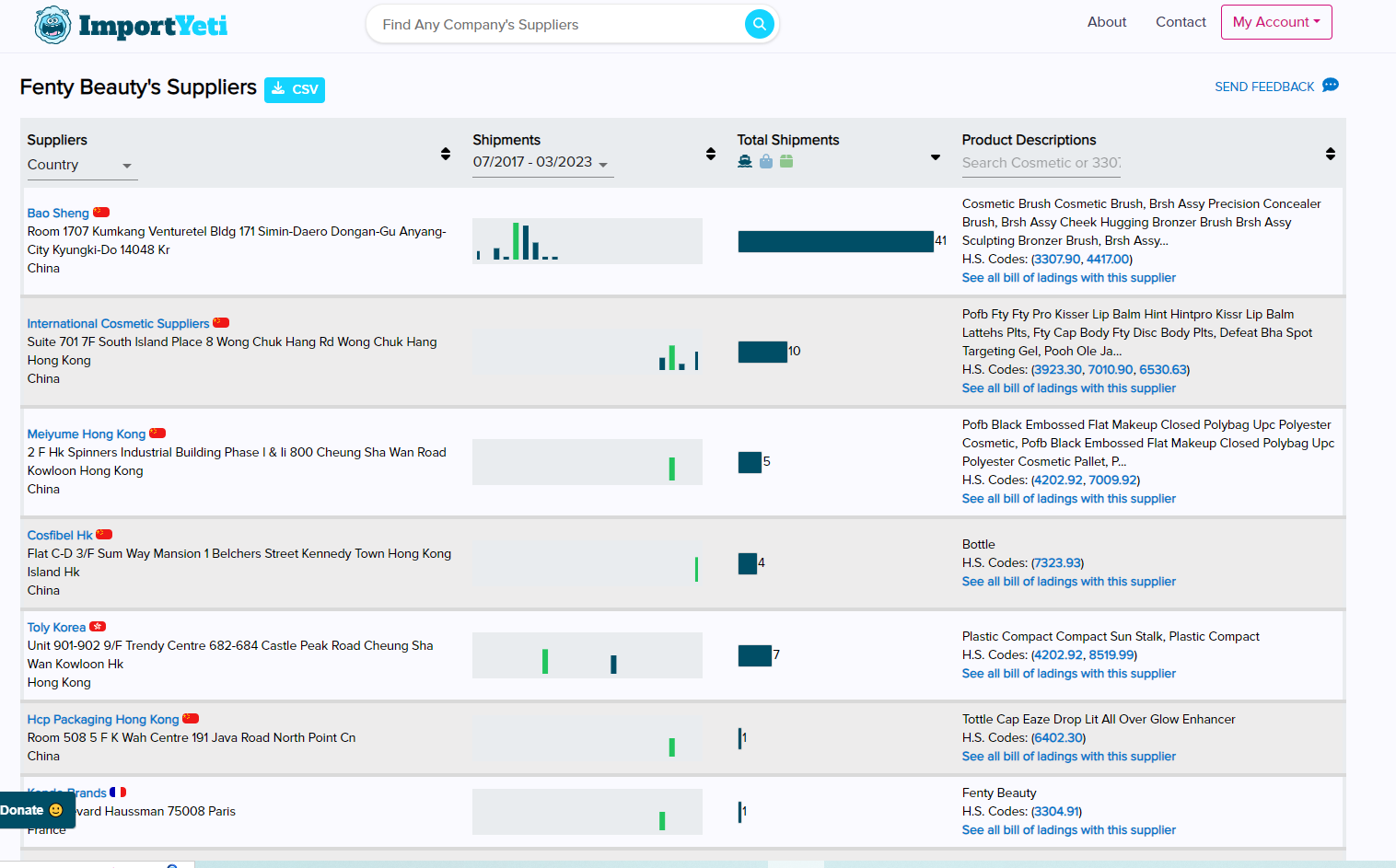
But remember, if a market is full of competitors and feels crowded, it might be hard to stand out.
On the flip side, if there aren’t many players in the game, it could mean there’s a hidden opportunity waiting to be grabbed.
➡ Use Social Media Communities
Social media is another valuable resource. Join groups related to dropshipping, like a Facebook group for Dropshipping.com, to gain insights and recommendations on dependable suppliers from people’s personal experiences.
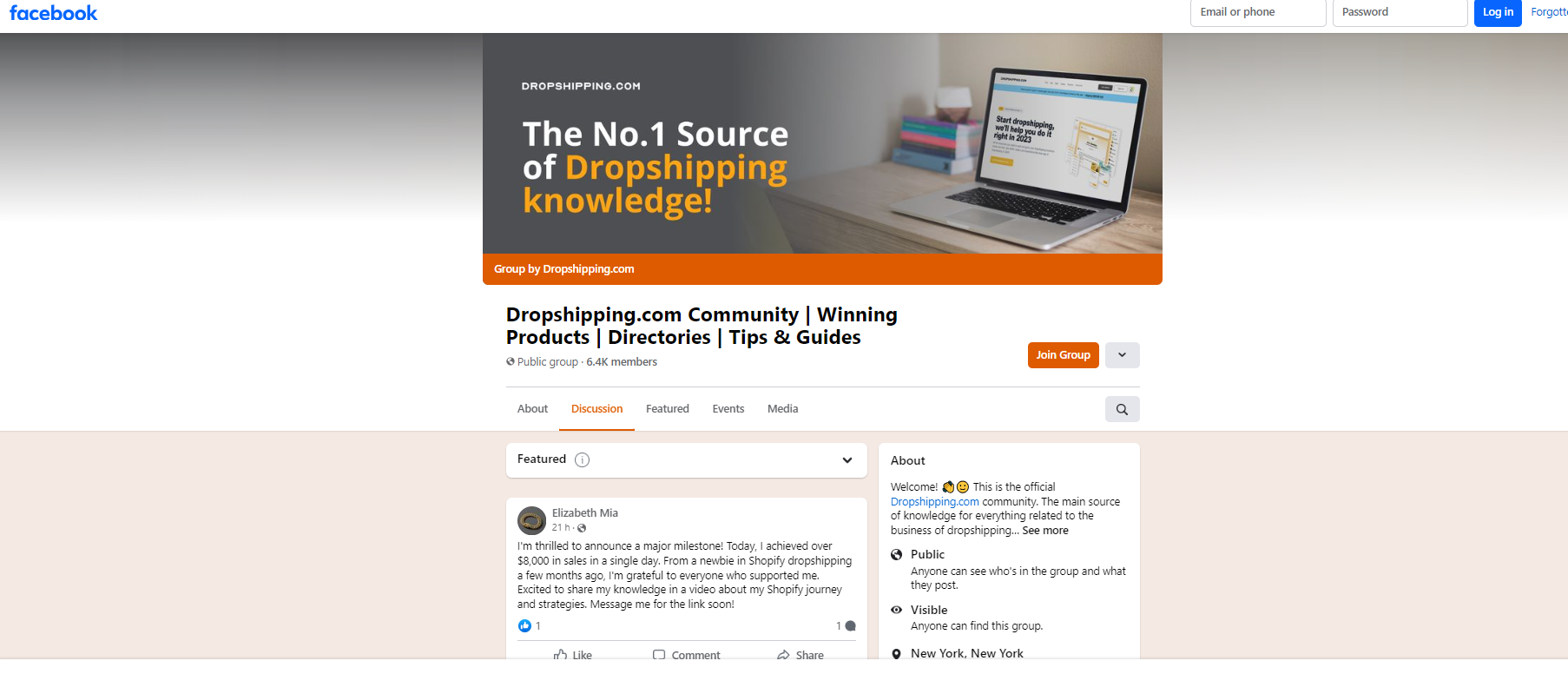
Also, do not forget to do thorough research on your dropshipping supplier of choice. The supplier you choose to do business with must be legitimately registered, reliable, and reputable.
Once you have done your product and supplier research, you are ready to start the dropshipping product sourcing process.
Contact The Dropshipping Supplier
When it comes to the dropshipping product sourcing method, a phone call is the most effective form of communication with your chosen supplier. But it is advisable to send a DM to make that first contact.
Then, you can pick up the phone. Talking to a representative can help you find out if they are customer-friendly.
If everything is going smoothly, it is time to negotiate contract terms with the supplier.
Hence, here are some suggestions on what you can discuss with the suppliers:
- Ask for Sample Orders: Before finalizing any deal, ask if you can place sample orders. This will allow you to personally assess product quality and packaging and also test the shipping times and customer service.
- Negotiate for Better Payment Terms: Depending on your cash flow, negotiate for terms that might benefit you, like net 30 or net 60 payment terms, which can help you manage your finances better.
- Discuss Shipping Times and Costs: Shipping is a critical component of customer satisfaction in dropshipping. Discuss and negotiate for the best shipping terms possible, including faster shipping options or subsidized rates.
- Address Product Quality and Compliance: Ask about how they ensure product quality and compliance with regulations, especially if you’re selling in markets with strict regulations like the EU or USA. It’s also wise to negotiate terms for dealing with non-compliant or defective products.
- Explore Marketing Support: Some suppliers may offer marketing materials or support to help you sell their products. This can include product photos, descriptions, or even marketing strategies.
Negotiate Contract Terms With Them
Do not be afraid to ask questions when negotiating contract terms with them.
Remember that you will not upset them with your questions since it is a common practice in their industry. For instance, ask if their prices are negotiable and they will let you know if this is the case.
If their prices are negotiable, start the negotiation process like a professional. For example, treat your negotiation counterpart with respect and politeness while presenting your reasons why they should give you a better deal.
Sure, there are many other things to negotiate with your chosen supplier, not just prices. And these things include shipping terms, payment due dates, cancellation, return policies, etc.
Hence, I will give you some tips for negotiations:
- Do Your Homework: Before entering any negotiation, research the supplier thoroughly. Understand their market position, strengths, weaknesses, and competitors. Knowing their products, services, and pricing strategies can give you leverage in discussions.
- Build a Relationship First: Try to establish a rapport with the supplier before diving into negotiations. Small talk, mutual interests, or shared connections can be good starting points.
- Be Clear About Your Needs and Goals: Whether it’s better pricing, more favorable payment terms, or improved delivery schedules, knowing your priorities helps you negotiate more effectively.
- Communicate Your Value to Them: Highlight the potential for long-term business, your growth prospects, and how the relationship could be mutually beneficial.
- Ask Open-Ended Questions: This encourages suppliers to talk more about their business, constraints, and what they can offer.
- Negotiate Beyond Price: While price is important, other factors can also significantly impact your business. Consider negotiating payment terms, minimum order quantities, lead times, and after-sales support.
- Prepare to Compromise: Be prepared to give something in return for what you’re asking for, and know in advance what you’re willing to compromise on.
- Use Silence Effectively: After making an offer or stating a position, don’t be afraid to stay silent. People often feel compelled to feel silent, which can lead them to reveal more information or make concessions.
- Always Have a Plan B: Knowing your alternatives gives you strength. If you can’t reach an agreement that meets your minimum requirements, be prepared to walk away and go with another supplier.
- Put Agreements in Writing: Once you’ve reached an agreement, ensure all terms are clearly documented and agreed upon by both parties. This helps prevent misunderstandings and provides a reference point for future discussions
In the end, make sure that the deal is a win-win for both parties.
Import Products Into Your Dropshipping Store & Start Placing Orders With Your Supplier
You have decided which products you want to sell so far, right? If so, it is time to add them to your online store.
In short, you need to browse your supplier’s product catalog, select your products, and list them on your online store. With this, you let your potential customers know that these products are available for sale.
When you receive an order, just forward the order confirmation along with your customer’s home address to your supplier sales representative.
The supplier will use your credit card to charge you the wholesale price of the product, including any processing or shipping fees. Then, they will ship the order directly to your customer’s home address.
Now, I will show you how I do this step-by-step.
Step By Step Guide To Dropshipping Product Sourcing (My Approach)
AutoDS shines as the go-to tool for speeding up and streamlining this process. It offers several easy-to-use options for importing products:
- One-Click Importer
- Single Product Uploader
- Multiple Product IDs/URLs
- Bulk Importer
I prefer the Single Product Uploader for adding items quickly to my Shopify dropshipping store. Let me walk you through the steps:
🔸 Source The Dropshipping Product
First, I find the product I am looking to sell, let’s say it is a Walmart product. The product URL/ID is right there in the web address at the top. I just copy this from Walmart’s site.

Then, I head over to AutoDS, click ‘Add Products,’ and select ‘Single Product.’ I paste the URL/ID into the box and hit the ‘Edit Now (Quick)’ to move it to drafts.
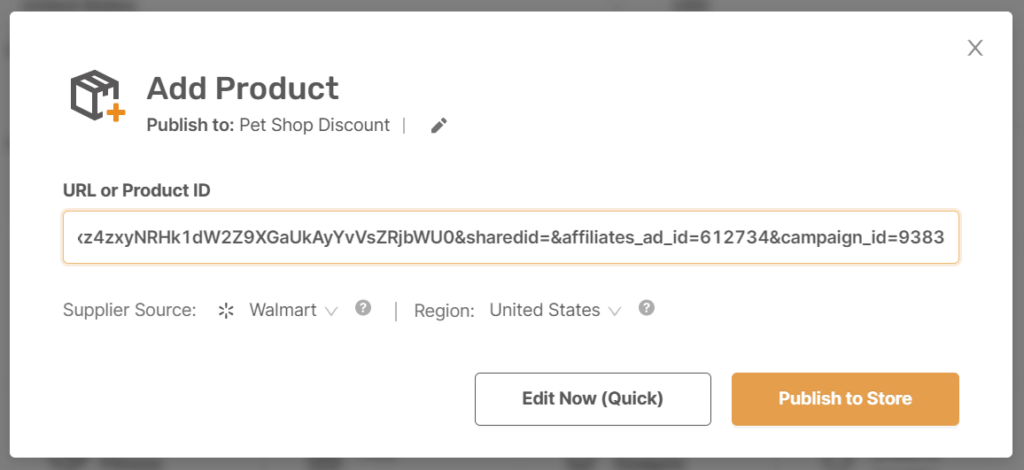
🔸 Edit The Dropshipping Product
Now comes the optimization part.
Titles, descriptions, images, and other details are automatically pulled from the supplier’s website.
Here, I make sure everything looks great and appeals to customers.
This is where I adjust the title, set the price, and maybe even tweak images using the advanced image editor on AutoDS.
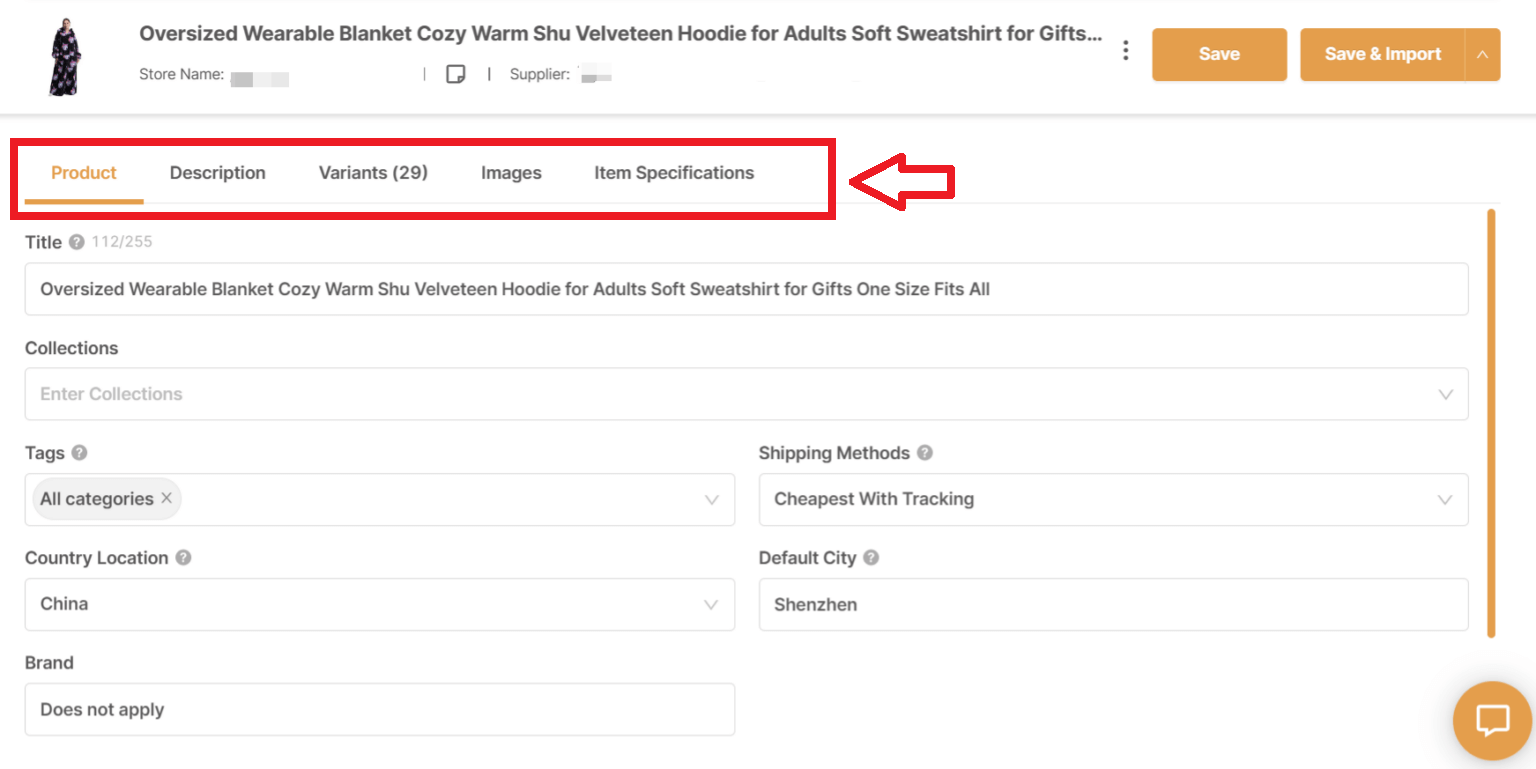
Moreover, AutoDS gives you the ability to add product variants, like size, weight, color, dimensions, etc.
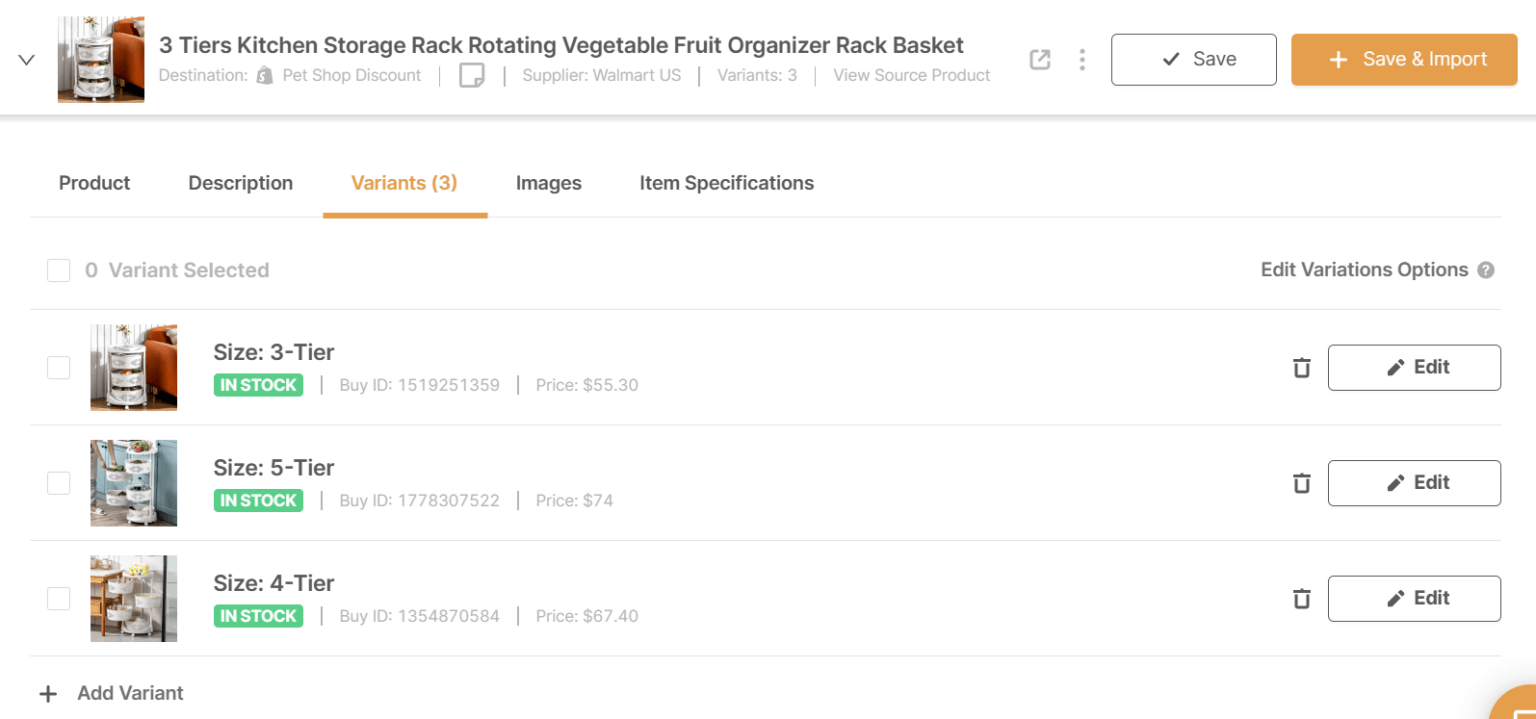
🔸 Import the Item to Your Shopify Store
After optimizing, I click ‘Save‘ and then ‘Save and Import’ to list the product on Shopify. At this point, it’s ready for customers.
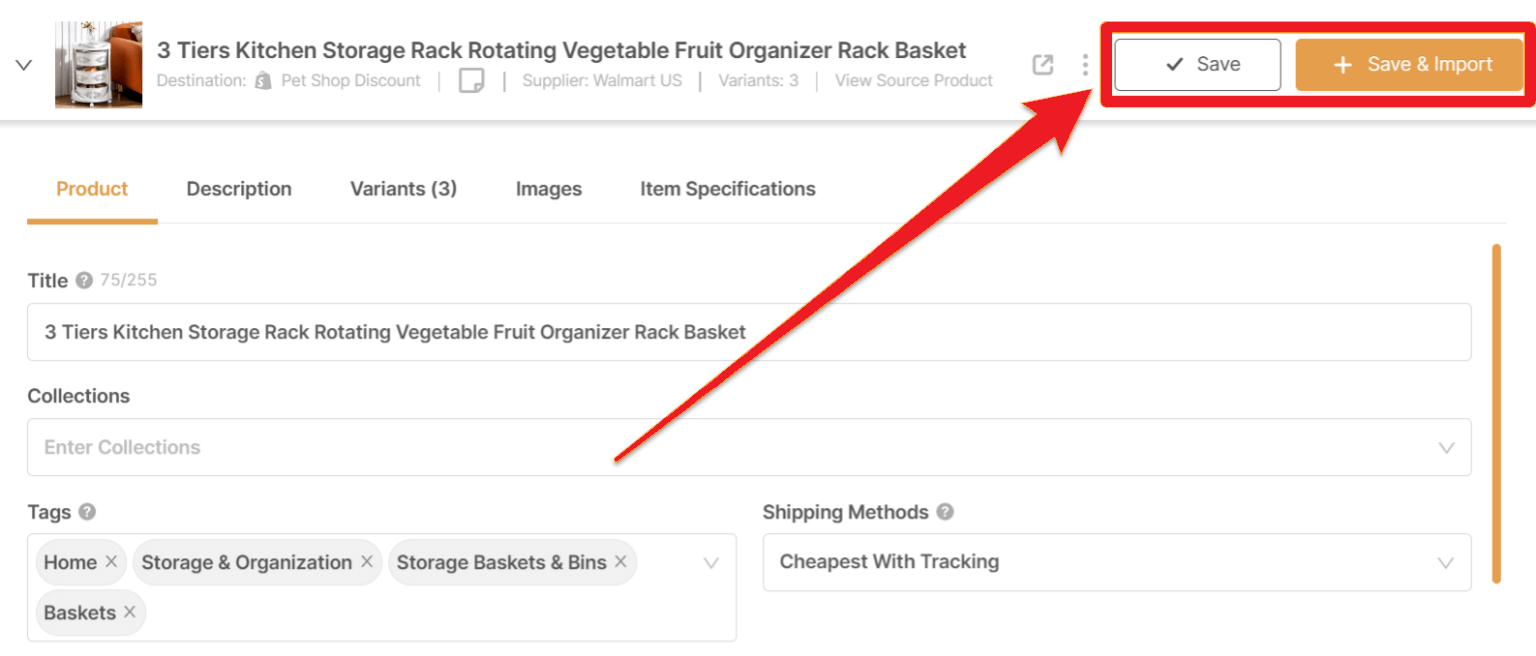
This automation not only cuts down on manual work but also minimizes mistakes.
Plus, it’s excellent for keeping pricing and stock levels accurate, as AutoDS updates these based on supplier information. This ensures our profit margins are always optimized.
Best Companies For Dropshipping Product Sourcing
AutoDS
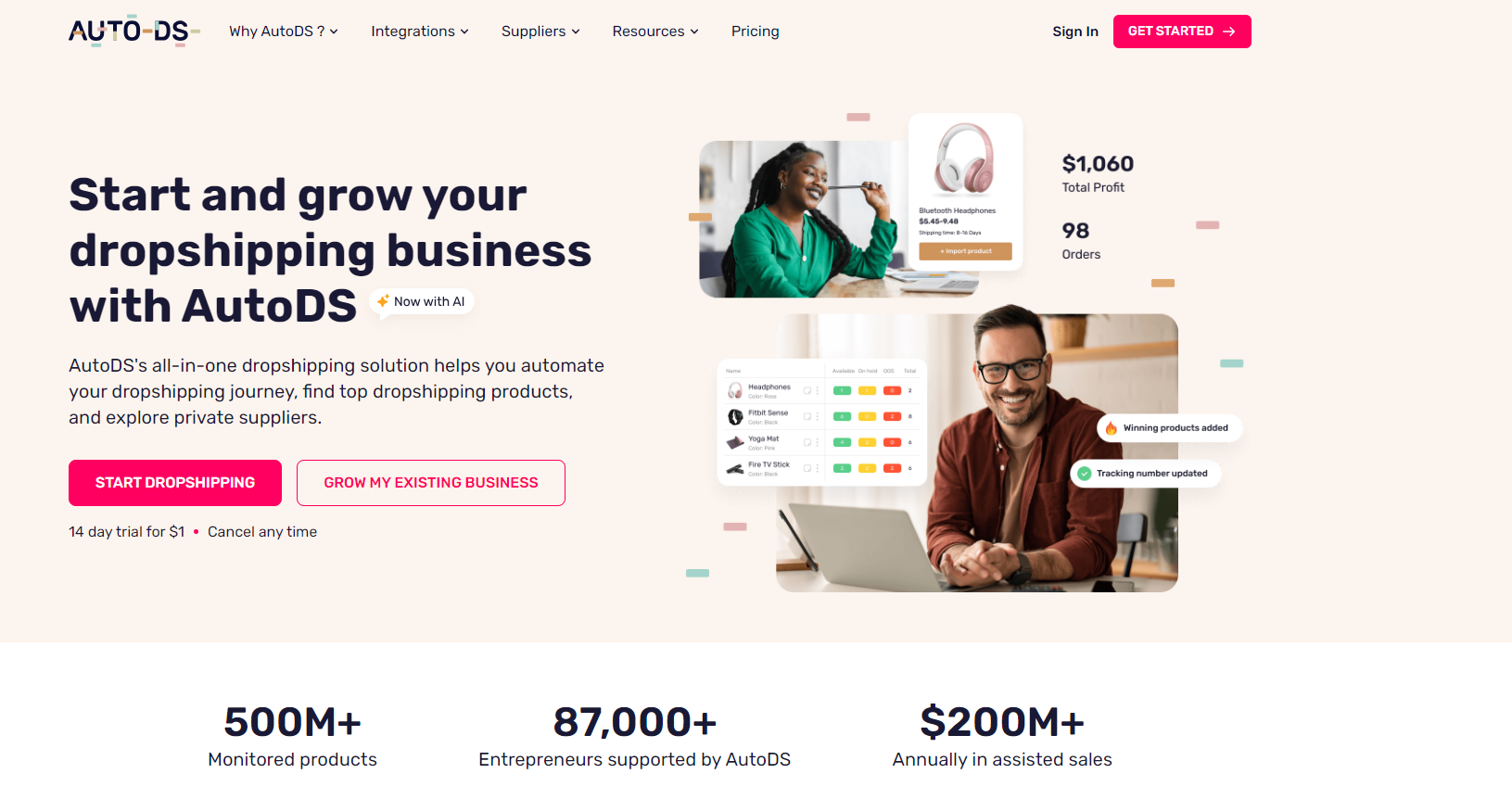
This tool works as an all-in-one helper for dropshipping, linking up with big names like AliExpress and Amazon. It gives you a huge range of trendy products to pick from.
Pros:
- ✔️ Huge product range.
- ✔️ Fully automates tracking and orders.
- ✔️ Works with many sales platforms.
Cons:
- ❌ Not all marketplaces are supported.
- ❌ Sometimes slow to get help.
Why Choose AutoDS: It simplifies finding and adding products, handles orders automatically, keeps an eye on prices and stock, and makes managing orders and inventory easy from one place.
Pricing: Starts cheap with a $1 trial. Costs depend on which platform you’re using like Shopify or eBay. Shopify starts at $17.90 a month, eBay at $9.90 a month.
SaleHoo
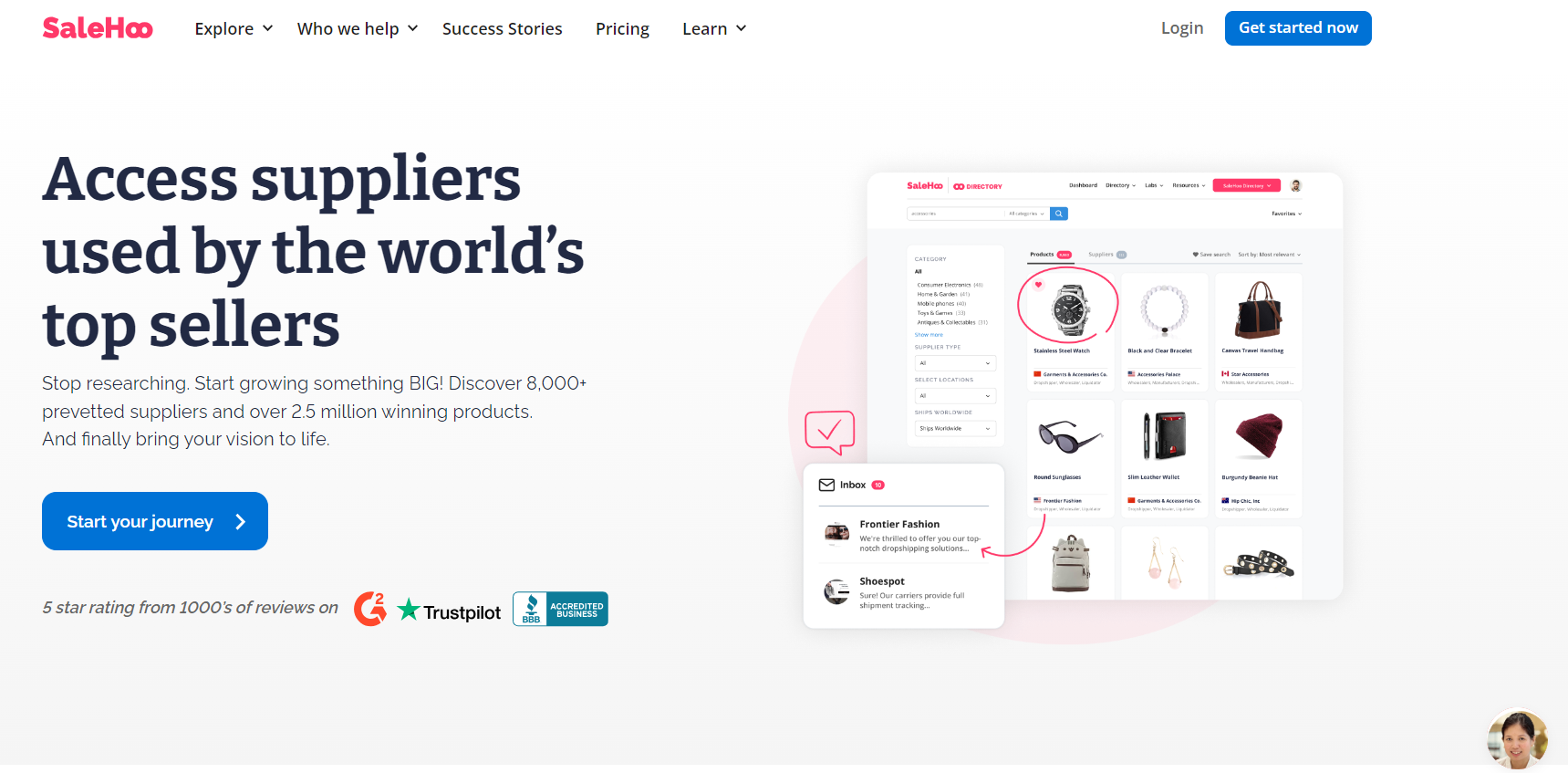
SaleHoo is a versatile tool that makes dropshipping easier with automation, offers a big list of suppliers, helps you learn more, and has a community of dropshippers.
Pros:
- ✔️ Huge list of suppliers.
- ✔️ Easy product importing with automation.
- ✔️ Lots of learning resources.
- ✔️ Great support team.
Cons:
- ❌ One-time payment may not suit everyone.
- ❌ Some e-commerce platforms can’t directly link.
Why Choose SaleHoo: It provides a big list of checked suppliers, automation tools for smooth dropshipping, helps beginners with educational content, and makes adding products quick with support from their team.
Pricing: $127 one-time for the supplier list; automation software is $27 a month or $97 a month.
👉 Read my review of Salehoo Dropshipping: The Ultimate 2024 Suppliers Directory Review.
Zendrop
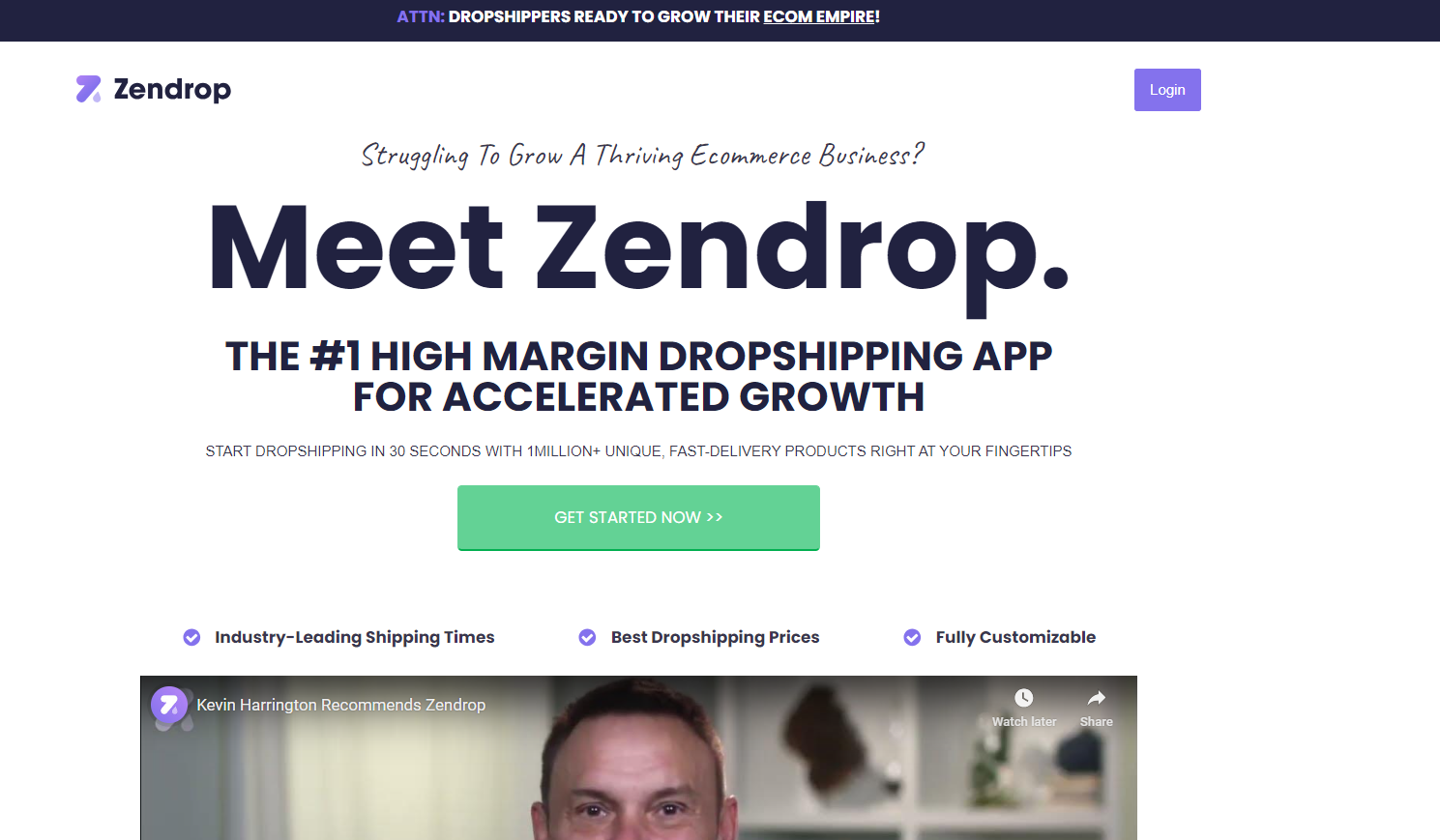
Zendrop connects reliable suppliers with online shops, offering lots of products and options for your own branding.
Pros:
- ✔️ Millions of products.
- ✔️ Your brand on the packaging.
- ✔️ Quick and various shipping options.
Cons:
- ❌ Extra costs for shipping and custom packaging.
- ❌ Need to order enough for custom packaging.
Why Choose Zendrop: It makes dropshipping smooth with automation, handles inventory and sourcing well, and provides quick shipping, branding options, and real-time stats.
Pricing: Free plan; Pro at $49 a month, Plus at $79 a month with a trial.
👉 Check out my Zendrop Review: Zendrop Shopify Pricing, Features, Pros & Cons, Shipping Times.
Spocket
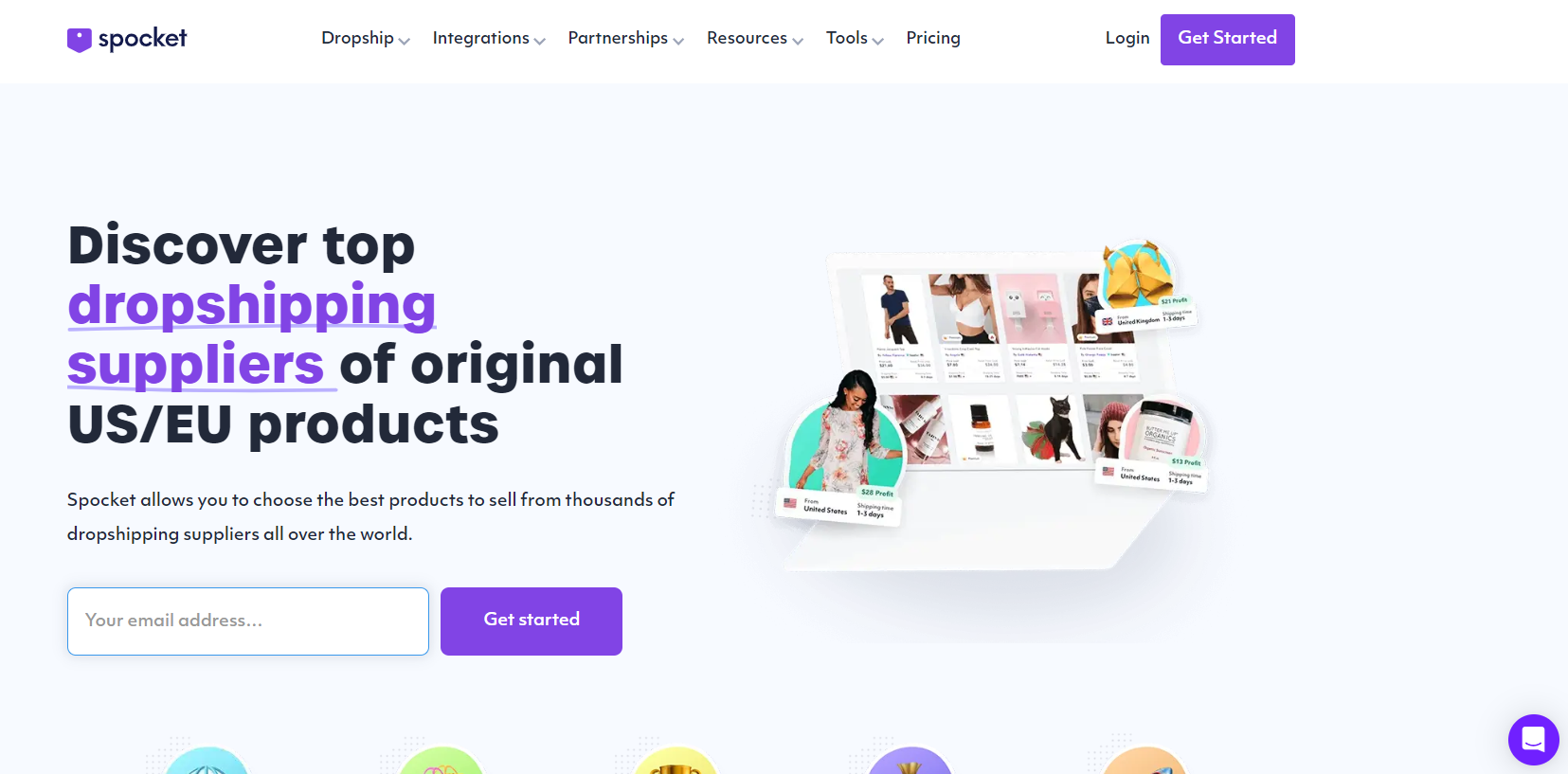
Spocket is great for getting high-quality items from worldwide suppliers and fits well with top e-commerce platforms.
Pros:
- ✔️ Easy to match with platforms and top suppliers.
- ✔️ Helps find the best products.
- ✔️ Excellent customer help.
Cons:
- ❌ Supplier prices can be high.
- ❌ Pricier plans.
Why Choose Spocket: It lets you sell premium items from global suppliers easily, works with Shopify, Wix, and others for quick shop setup, and supports dropshippers in the EU and US with quality products.
Pricing: Free to $299 a month across five plans.
👉Check out my Ultimate Guide to Dropshipping With Spocket in the EU & US.
DSers
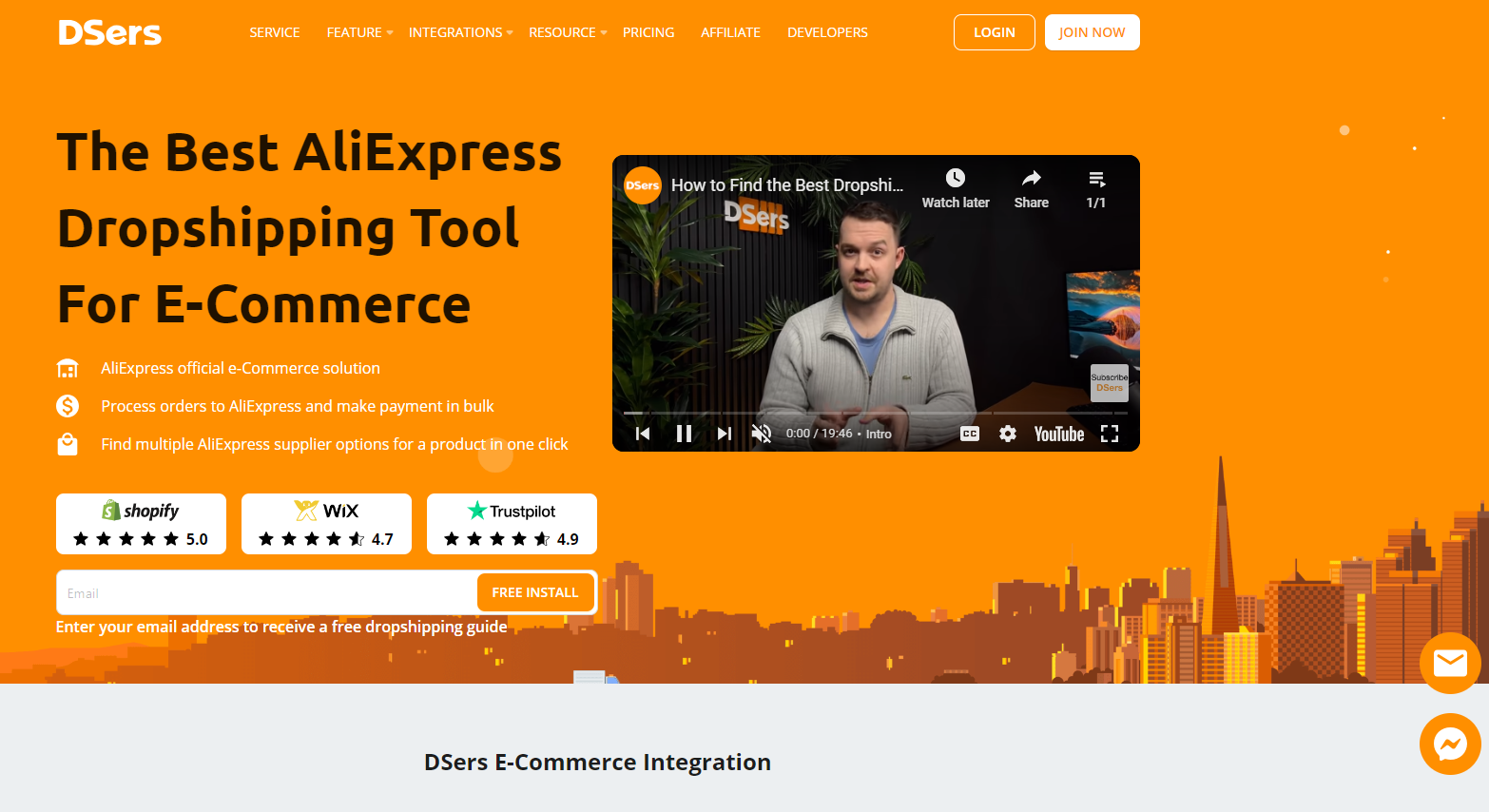
DSers makes it easier to manage imports from AliExpress, edit products, and optimize for efficiency and bulk operations.
Pros:
- ✔️ Fast bulk orders.
- ✔️ Advanced editing tools.
- ✔️ Free and business plans available.
Cons:
- ❌ Limited to certain platforms.
- ❌ Only focuses on AliExpress.
Why Choose DSers: It’s all about picking the best suppliers, handling lots of orders and product bundles at once, and keeping track of orders and updates automatically.
Pricing: Varies; free to $499 a month for the Enterprise plan.
Inventory Source
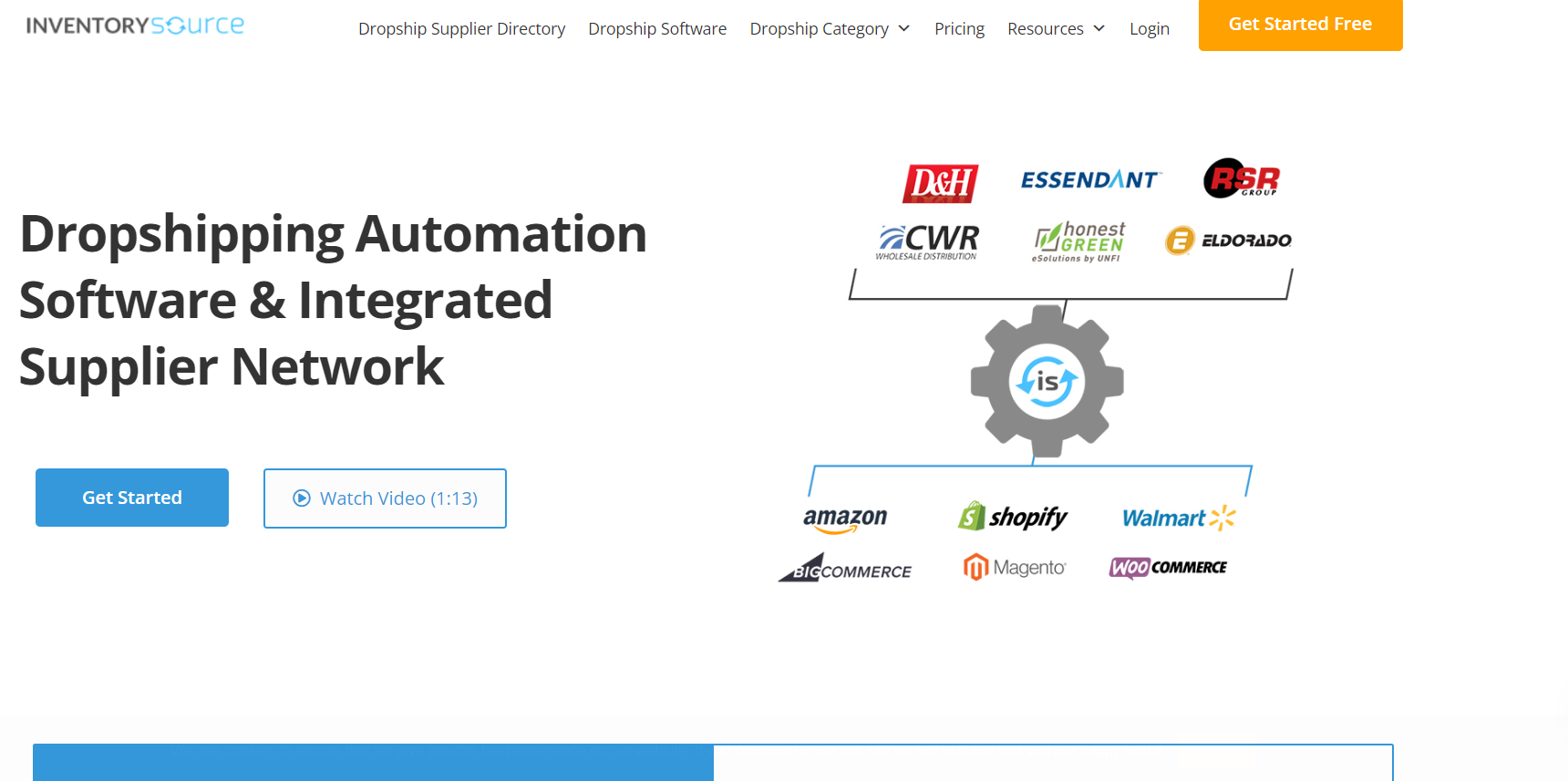
Inventory Source is all about automation, making it super easy to manage supplier relationships and order processes.
Pros:
- ✔️ Lots of options for managing suppliers.
- ✔️ Automates key dropshipping tasks.
- ✔️ Brings everything together for your business.
Cons:
- ❌ Extra features and linking up can cost more.
Why Choose Inventory Source: It’s great for finding and managing suppliers, automating product listings, syncing inventory, and works with over 25 e-commerce platforms.
Pricing: Free account; $99 a month for Inventory Automation, $199 a month for Full Automation.
Check out Inventory Source Review: The Best Automation Software for Dropshipping?
Sellvia
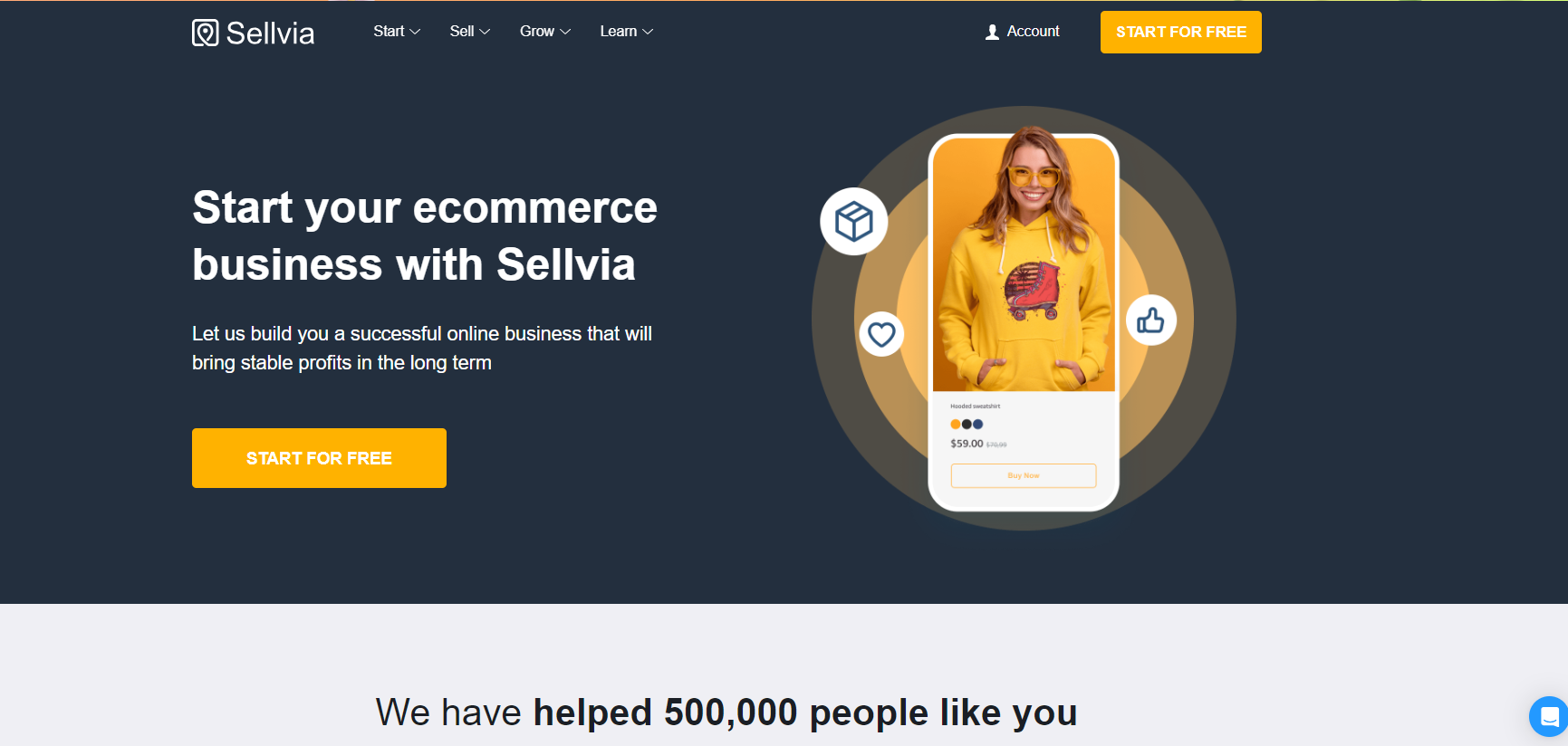
Sellvia is special because it combines marketing insights with strong dropshipping automation to increase profits and simplify managing your business.
Also, read my Sellvia Review: How It Works and Is It Worth It In 2024.
Pros:
- ✔️ Marketing tools and advice included.
- ✔️ Makes business management easier.
- ✔️ Wide range of products.
Cons:
- ❌ Mainly for the US, not so much for the world.
- ❌ Marketing tools might need some learning.
Why Choose Sellvia: It provides a complete eCommerce platform, makes adding products easy, and offers designs and automated processes that really sell.
Pricing: Plans at $39 a month and $69 a month.
Succesful Life Stories For Effective Dropshipping Product Sourcing
Irwin Dominguez – A Success Story in Dropshipping

Irwin Dominguez, a marketer from San Diego, ventured into dropshipping without prior experience in e-commerce.
His success story is often highlighted in dropshipping circles due to his rapid financial success, reportedly achieving over $1 million in earnings within his first year of starting his dropshipping business.
Product Sourcing Strategy:
- Niche Selection: Dominguez started by carefully selecting a niche that he believed had potential but was not oversaturated. The exact niche is often not specified in success stories for privacy and competitive reasons, but the focus was on finding products with high demand and low market saturation.
- Supplier Partnership: He utilized AliExpress to source products, emphasizing the importance of selecting suppliers with high ratings and positive reviews. The reliability, quality of products, and the ability to fulfill orders promptly were crucial criteria in his selection process.
Apps and Tools Used:
- Shopify: For his online storefront, Dominguez chose Shopify, a popular e-commerce platform that is known for its ease of use, scalability, and integration with various dropshipping apps.
- Oberlo: He leveraged Oberlo, an app that integrates directly with Shopify, to streamline the process of importing products from AliExpress into his store. Oberlo facilitated product selection, inventory management, and order fulfillment, automating many aspects of the dropshipping process.
- Facebook Ads: To drive traffic to his store, Dominguez utilized Facebook Ads extensively. He focused on creating targeted ad campaigns to reach potential customers who were most likely to be interested in his products. The ability to test and tweak ads in real-time allowed him to maximize his marketing spend efficiency.
Alex Philip – 15 Years Old Millionaire
Alex Philip became famous as one of the world’s youngest and most successful dropshippers. At just 11 years old, he started selling Pokemon toys on his Amazon store. By 15, he had made over $2 million by finding products on Alibaba and selling them on Shopify.
In 2017, Alex discovered dropshipping and opened his own store. Now, he finds products from suppliers in China and brings customers to his Shopify store.
Alex focuses more on creating a strong marketing strategy rather than just making his store look good. He believes that without good marketing, you won’t make sales.
With help from Julian Hall, Alex learned how to make his store convert better, run profitable Facebook ads, and optimize his online store.
He also spends time before school doing research on Instagram and Facebook to see what products are trending. Even though he might spend $400 to $500 on Facebook ads, picking the right product can bring in a lot more money.
Alex advises other young dropshippers to concentrate on learning and getting better, not just on making money.


Dropshipping Product Sourcing FAQs
1. How do you handle customer returns or exchanges when working with dropshipping suppliers?
Handling customer returns or exchanges in a dropshipping model involves direct coordination with your suppliers.
The process typically starts by establishing a clear return policy that aligns with your supplier’s policies. When a customer initiates a return, communicate directly with the supplier to understand their process for returns and to arrange for the product to be sent back to them or their specified location.
It’s crucial to mediate the process carefully to ensure the customer’s satisfaction while adhering to the supplier’s guidelines.
Refunds or exchanges are then processed based on the agreement between you and the supplier, with the aim of minimizing inconvenience to the customer.
Transparent communication with customers about the status of their return or exchange is essential throughout this process.
2. What specific criteria should be used when evaluating the reliability and quality of potential dropshipping suppliers?
Evaluating the reliability and quality of potential dropshipping suppliers requires a focus on supplier history, product quality, fulfillment capabilities, and customer service responsiveness.
Look for suppliers with positive reviews and testimonials from other businesses, indicating a track record of reliability and quality.
Test orders can provide firsthand experience with the product quality and shipping times.
Assess their fulfillment capabilities by inquiring about average shipping times, handling procedures, and how they manage out-of-stock situations.
Finally, gauge their customer service responsiveness by initiating communication and noting their response time and willingness to provide detailed information.
These criteria can help identify suppliers capable of supporting your business goals and maintaining customer satisfaction.
3. What are the legal considerations and agreements needed when setting up partnerships with dropshipping suppliers?
Setting up partnerships with dropshipping suppliers involves navigating legal considerations to protect your business and ensure a smooth operation.
Formal agreements or contracts are essential to outline the terms of the partnership clearly, including payment terms, order fulfillment expectations, return policies, and handling of customer data.
It’s important to ensure compliance with local laws and regulations, particularly regarding consumer protection, privacy, and e-commerce operations.
Consulting with a legal professional can provide tailored advice and help draft agreements that cover all necessary aspects of the partnership.
This approach minimizes the risk of disputes and establishes a solid foundation for a successful collaboration with suppliers.
Final Thoughts
To summarize, before sourcing products, you have to choose a product sourcing method that works for you.
If you opt for the dropshipping product sourcing method, evaluate different dropshipping suppliers and then pick one to work with.
Finally, use our advice to source products for your dropshipping store the right way.













![The Top 21 3PL Companies Compared [2024 List & Guide]](https://images.weserv.nl/?url=https://prod-dropshipping-s3.s3.fr-par.scw.cloud/2024/03/Frame-3922469.jpg&w=420&q=90&output=webp)